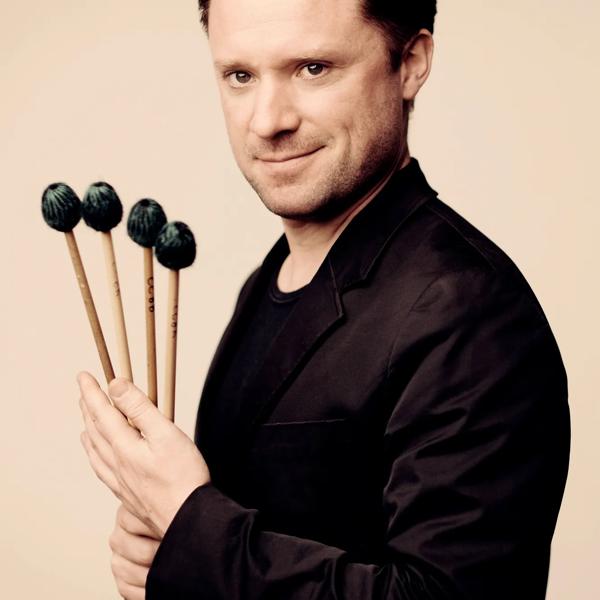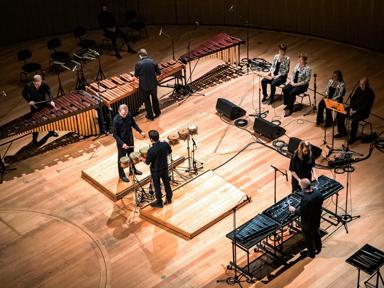Colin Currie: 6 pieces of music I couldn’t live without

Ahead of his return to our Queen Elizabeth Hall in March, percussionist and Southbank Centre Associate Artist Colin Currie shares with us six recordings that he simply couldn’t live without.
Steve Reich: Tehillim/Three Movements
The first time I ever heard a large-scale work by Steve Reich live was in 1994, having just moved to London to study at the Royal Academy of Music. The work in question was ‘Three Movements’ and I recall being giddy with excitement at the vibrancy, tension and exultation of the music. I was utterly consumed by it, it ate me whole.
This album also features ‘Tehillim’, a work I’ve become extremely close to, having conducted the music several times with my own group and in the composer’s presence (initially rather infamously in Japan when our flight to Tokyo was cancelled and we forfeited half of our rehearsal time!). This work is perhaps his most uplifting – ending with a Hallelujah Chorus in D Major – and shows again that for all the rhythmical splendour of this composer, it’s his harmonic heart that beats the most deeply.
Colin Currie Group and Synergy Vocals will be bringing Steve Reich’s ‘Tehillim’ back to the Royal Festival Hall along with a brand new work, also a Psalm-setting entitled ‘Traveler’s Prayer’, in the autumn.
Bela Bartók: The 6 String Quartets
Honestly? I seriously would struggle to get by without this music. And though I feel I don’t have the words to describe the music itself, this recording is indeed magnificent for its clarity, daring choice of sonorities, punchiness and sheer beauty. Could one have a favourite quartet out of the six? The pot-boiling 5th perhaps, or the wondrous 4th? Maybe the spiky 2nd, or the harrowing 6th? Ah, then there’s the youthful 1st, or what about the edgy 3rd? I guess, probably not. Best to just keep the music on repeat for evermore.
Oscar Peterson: The London Concert Live at the Royal Festival Hall 1978
My parents had a copy of this staggering album on vinyl and I used to dance around the kitchen to it like a mad thing. Well, actually, that still happens! I think what’s special about this album is both the sheer high octane energy and the finesse of the musicianship; a combination of ideals that one doesn’t automatically encounter in the concert hall. The Royal Festival Hall is definitely one of those ‘sacred spaces’ where the stage has been graced by musical legends from every walk of life, and it’s always an astounding buzz to take that platform knowing that things like this concert in 1978 actually happened there.
As a side-note I must reference the track ‘Sweet Georgia Brown’, which is rebooted at a break-neck tempo in this version, commencing with traded solos between Peterson and the drummer Louis Bellson. His work on the snare drum reminds me of why I first took up percussion when I was a young boy. There’s something indefinably electrifying about the sound of that particular drum as it crackles, fizzes and explodes with sound.
Sarah Kirkland Snider: Mass for the Endangered
This ravishing album came to my attention during some of the most disconcerting times of lockdown last year. A sumptuous, but gloriously judged new setting of the Mass, this music caresses, haunts, and illuminates the listener with its tender melodies, and a harmonic language that grasps you smoothly yet firmly. With a profound ethical dimension (the work appeals for ‘greater awareness, urgency and action’) linked to the natural world and our troubled relationship with it, I find this music perfectly elides my own sense of spirituality and connection to nature.
Igor Stravinsky: Petrushka/The Rite of Spring
(The Cleveland Orchestra, Pierre Boulez)

Did modernity in music begin here? Nay, did it maybe even end here? There are too many fascinating conversations to be had about these early Stravinsky ballets, but better still just to listen to them in wonder, as they grow ever more extraordinary with time. ‘Petrushka’ mapped out almost every single stylistic template for composers going forward, one tableau at a time, and ‘Le Sacre’ would simply leave the trajectory of music in jagged and controversial pieces, never to be the same again and so much the better for it.
This recording is one I am very fond of, as it brings together many strands for me; most especially Boulez whose concerts I would attend year after year in London. These events culminated in the last time I ever heard him live (before his passing in 2016) at the Royal Festival Hall in what I also imagine would have been the last time he ever conducted his extraordinary and unique ‘Pli Selon Pli’.
The Cleveland Orchestra is also a sensational force for this music, and every bit that brilliant American symphonic sound. I have been fortunate enough to play with dozens of US orchestras in my career and I nervously await the opportunity to do so again. I miss them very much indeed.
Steve Martland: Horses of Instruction
Living without Steve (he died suddenly in 2013 of a heart attack) is hard enough, and so to go on without his music would be intolerable. This album features many of his key works written for his own ensemble, which are to me tied up with extraordinarily vivid memories of his asking me to join his band as a teenager, and performing widely with the group at that time in the 1990s. The gigs were dare-devil, adventurous, humorous...and occasionally blisteringly brilliant.
On this album the diptych of ‘Horses of Instruction’ and ‘Eternal Delight’ (both take their titles from William Blake) combine for a remarkable and immensely powerful listen. Rhythmic erudition is at the fore, but just like the other Steve in my life (Reich) there’s an underlying lyrical quality, a vast emotional landscape, that enthrals above all.

See the Colin Currie Group perform works by Reich and give the UK premiere of a new work by Mark-Anthony Turnage, here on 28 March.